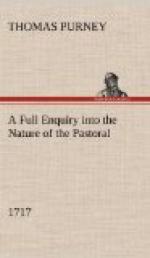The difference between the Knowledge of our Shepherds, and that of politer Persons, must not proceed in the least from any difference in their Natural Endowments, but entirely from the manner of their Educations. The Poet therefore, has nothing to do in this Case, but to consider what is most probable for Nature to effect, unassisted by Art.
As for a Shepherd’s knowing what the ancient Poets have deliver’d, concerning the different Ages, and other things, I shall not determine whether ’tis natural or not: because not only Theocritus, whose Shepherds are as well vers’d in History as other Men, and Virgil, whose Shepherds are often Philosophers, have gone in this way, but our Countryman Mr. Phillips also, whose excellency is his Correctness.
(Lang.) Thrice happy Shepherds now!
for Dorset loves
The Country Muse, and our delightful Groves.
While Anna reigns. O ever
may she reign!
And bring on Earth a Golden-Age again.
Pastor.
6.
I shall leave the Reader also to determine concerning
the following piece of Knowledge.
(Hob.) Full fain, O blest Eliza! would I praise Thy Maiden Rule, and Albion’s Golden Days. Then gentle Sidney liv’d, the Shepherds Friend: Eternal Blessings on his Shade descend!
The same is to be said of other the like Passages, but the most ordinary Capacity may judge what Knowledge is, or is not, consistent with the Banner of a Shepherd’s Education.
CHAP. IV.
How to form the Pastoral Characters, and the great Difficulty of doing it.
A Poet, who would write up to the Perfection of Pastoral, will find nothing more difficult (unless the Dialect) than the inventing a sufficient Number of Pastoral Characters; such as are both faultless and beautiful. That difficulty proceeds from hence.
In Epick and Tragick Poetry we have the whole scope of all Men’s Tempers and Passions to draw; which are widely various and different: As, the Savage and Wild; the Ambitious; the Simple and Tender-hearted; the Subtle, &c. Thus in the Epick and Tragick Poems, you draw the general Qualities of all Men’s Minds. But in Pastoral, you are pinn’d down to one of these common qualities (which is Simplicity and Tenderness.) And laying that as a Foundation, from thence draw your particular Characters. In every Character still supposing that at the bottom of it, and to accompany it. But Rules of this Nature, are like Mathematical Assertions, not easily explain’d, but by Examples. Tho’ I think, Cubbin, I need not insist long on this to you; for your Characters are not much faulty in this particular. If I remember aright; some of your Characters are these:
Paplet has Simplicity and Tenderness: But her distinguishing Character is, that she is a May, so young, as to be entirely ignorant of Love; but extreamly Curious to be let into the Nature of Men and Lovers.




